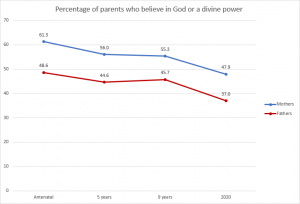
The data being used in this programme is mainly derived from the Avon Longitudinal Study of Parents and Children (ALSPAC). The data collected over the years on the participants’ environment, their development, well-being, personality, mental and physical health can be explored using this website: Explore data and samples | Avon Longitudinal Study of Parents and Children | University of Bristol.
Questions related to Beliefs, Behaviours and Health
There are several sets of relevant beliefs and behaviours data already available for analysis. These are described in the following publications:
Those asked of the study parents immediately before the pandemic:
BBH#2. Iles-Caven Y, Bickerstaffe I, Gregory S, Northstone K, Golding J. Parental spiritual and religious beliefs and behaviour data collected from the Avon Longitudinal Study of Parents and Children, 2020. Wellcome Open Res 2021.
Those asked of the study offspring (G1s) immediately before the pandemic:
BBH#3. Iles-Caven Y, Bickerstaffe I, Northstone K, Golding J. Spiritual and religious beliefs and behaviour: data collected from 27/28-year-old offspring in the Avon Longitudinal Study of Parents and Children, 2019-2020. Wellcome Open Res 2021.
From the data described in these publications we were able to outline the trends of religious belief and behaviour in the parents over a 27 year period from the pregnancy during which the mother was enrolled until her offspring was aged 27/28 in 2020.
Figure showing the trends over time in the proportion of parents who had a positive belief.

Previous beliefs and behaviours data collected on the children
Unlike the enrolled mothers and their partners who were asked about their beliefs and behaviours on several occasions from prenatally to the 2020 sweep, only a few questions were asked of the mother concerning her child’s religious upbringing and behaviours such as praying at the ages of 5, 6, 9 and 11 years. The child was asked directly at ages 16 and 18 years, but the information collected was not as extensive as asked of their parents. These data are described briefly in BBH#3. The data collected in 2020 therefore are the first detailed assessment of the beliefs and behaviours of the G1s in regard to religion and spirituality.
As noted in BBH#3, the most striking observations are that in almost all aspects of RSBB the offspring of both sexes are more secular than their parents, especially when compared with their mothers. For example, 56.2% of offspring stated that they did not believe in God, or a divine power compared with 26.6% of their mothers and 45.3% of their mothers’ partners. When asked about their type of religion, 65.4% of offspring stated ‘none’, compared with 27.2% of mothers and 40.2% of partners. This confirms previous research reporting increasing secularisation from one generation to the next. As with the mothers and their partners, female offspring were more likely than males to believe in a divine power and to practice their beliefs.

